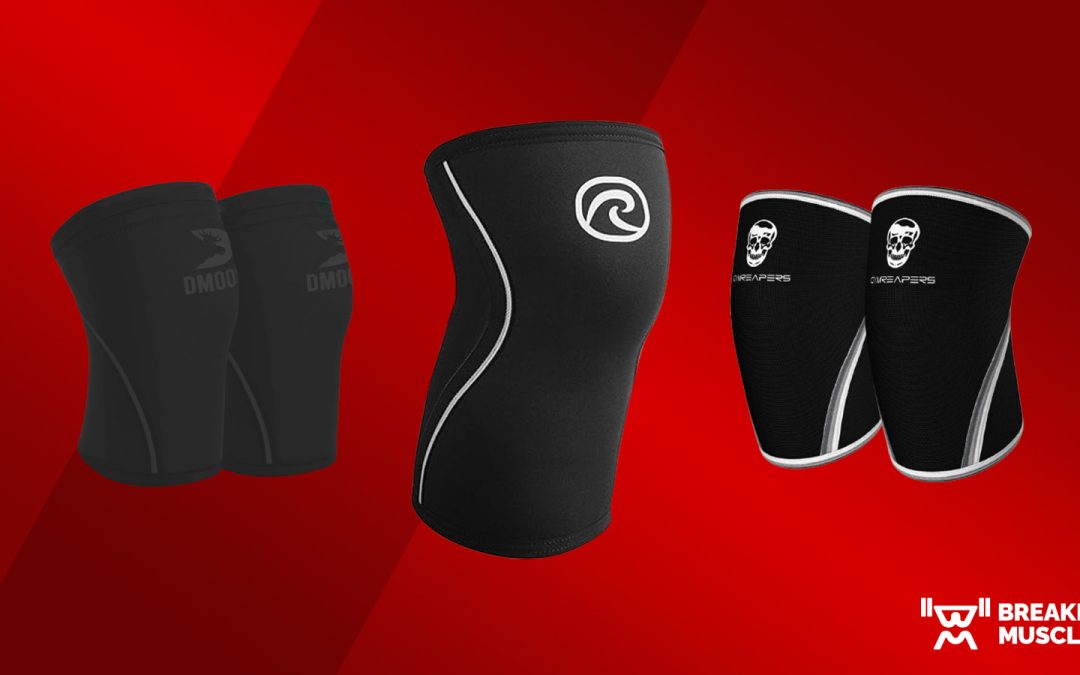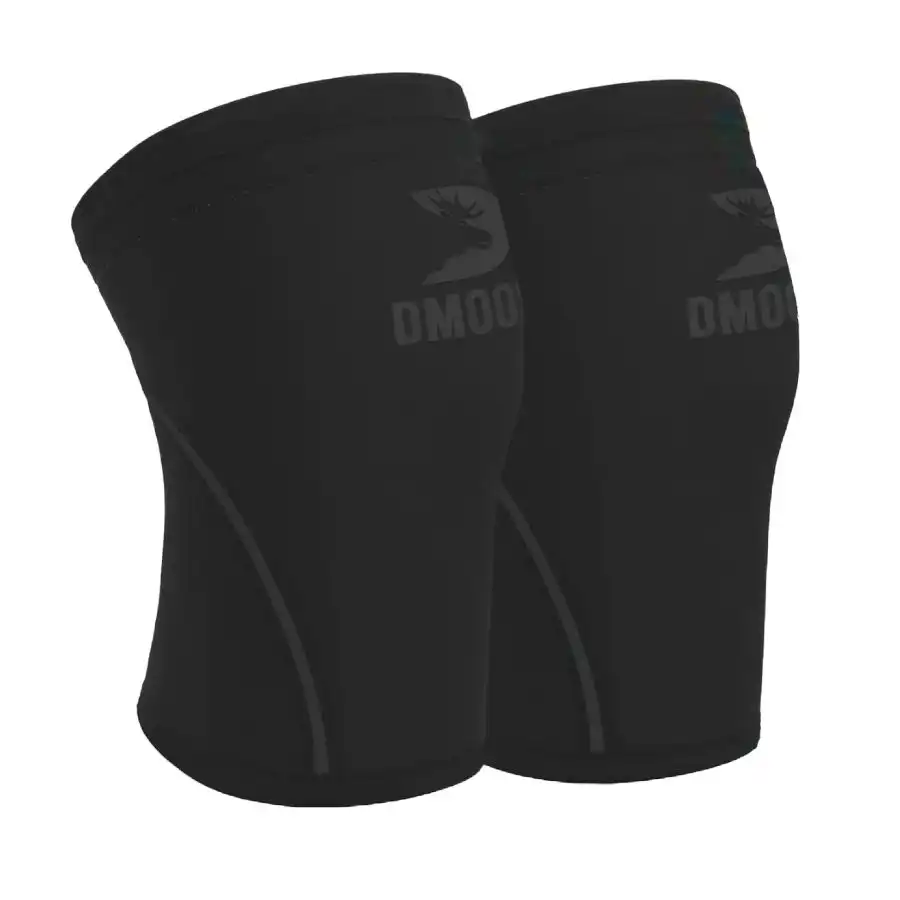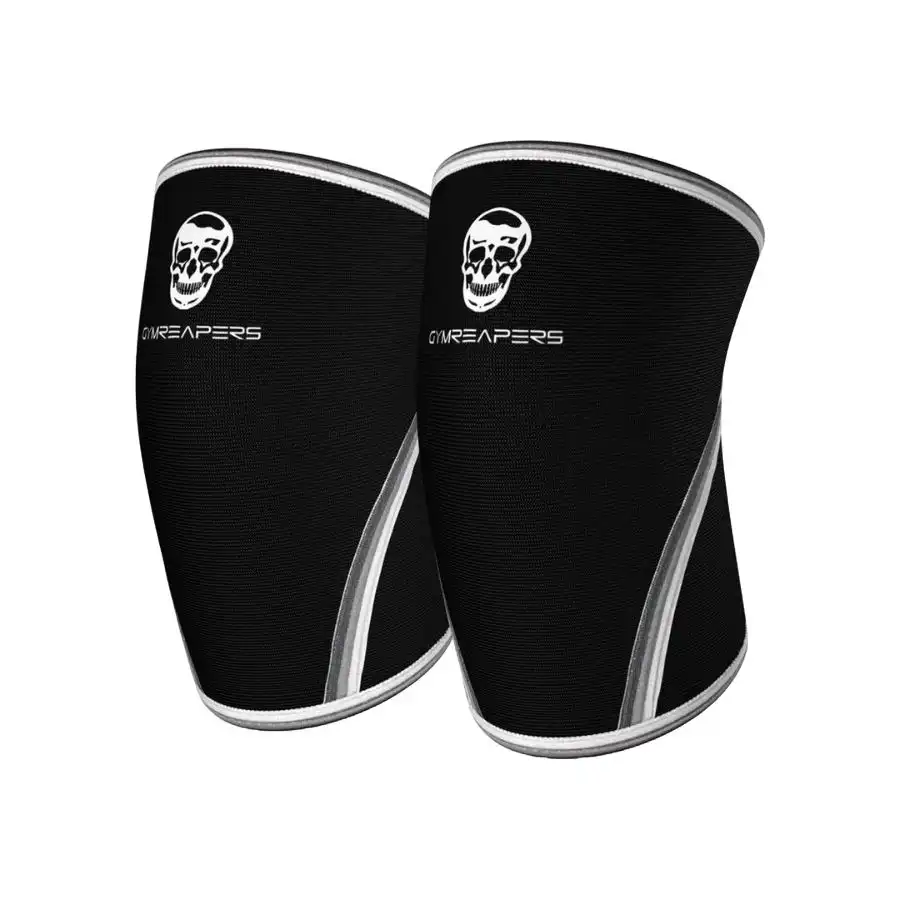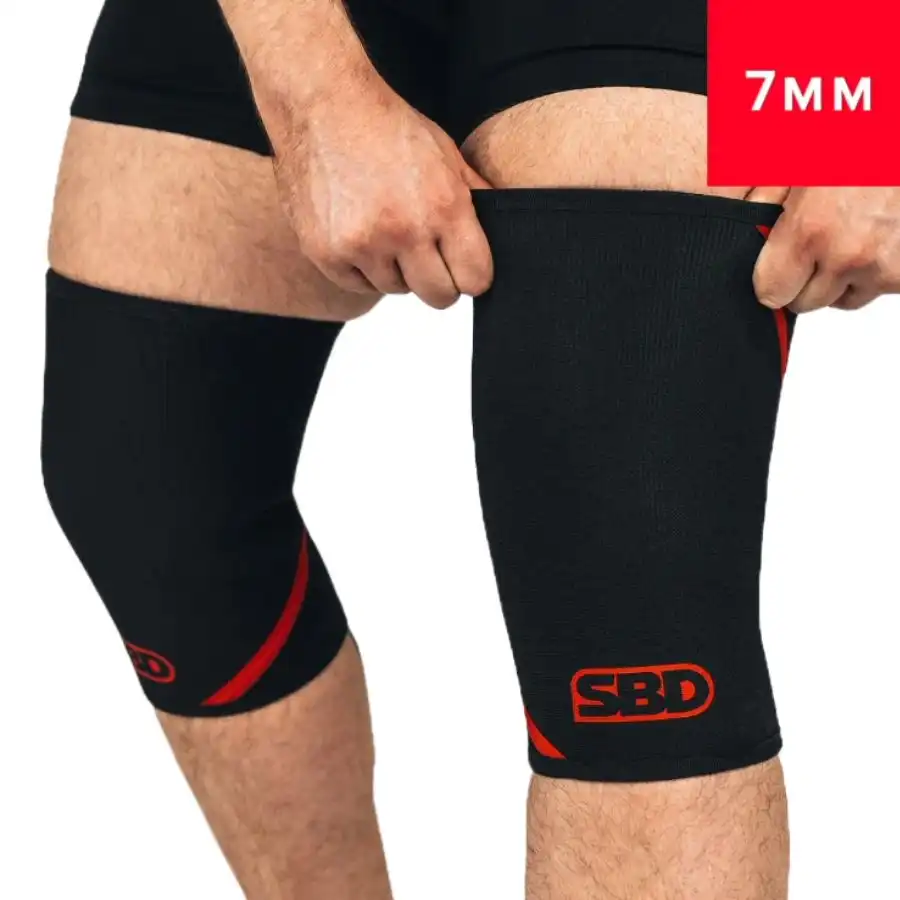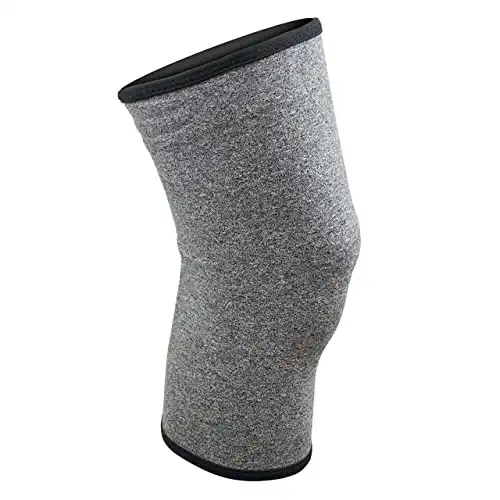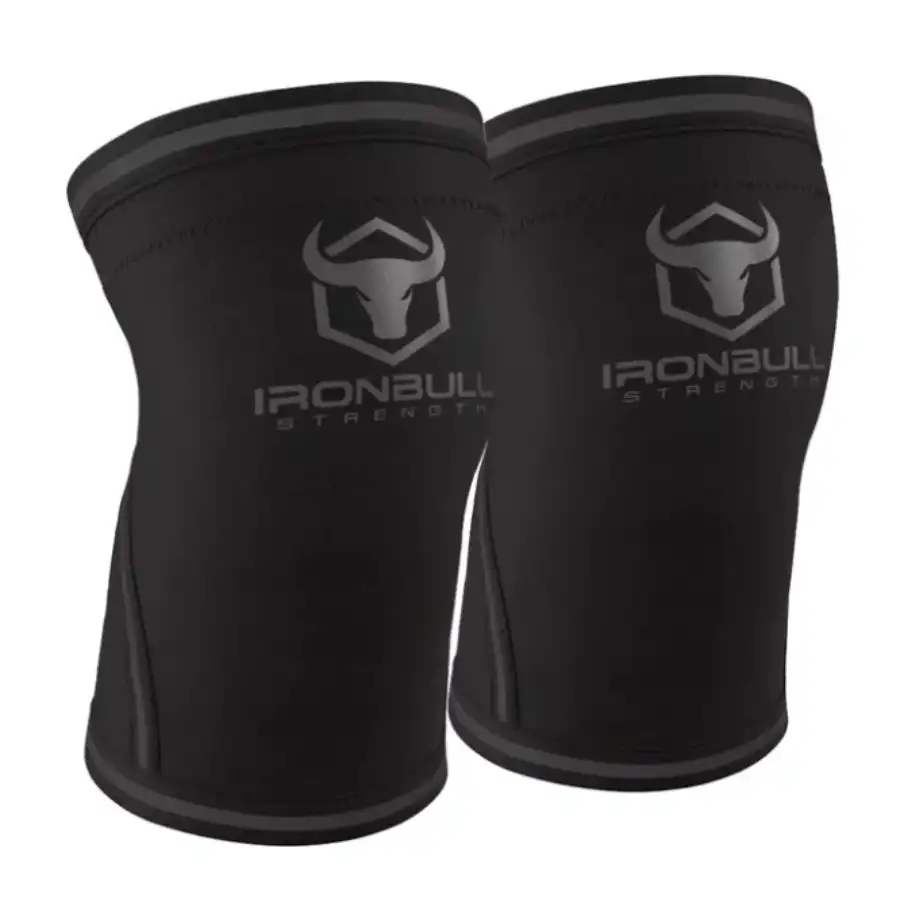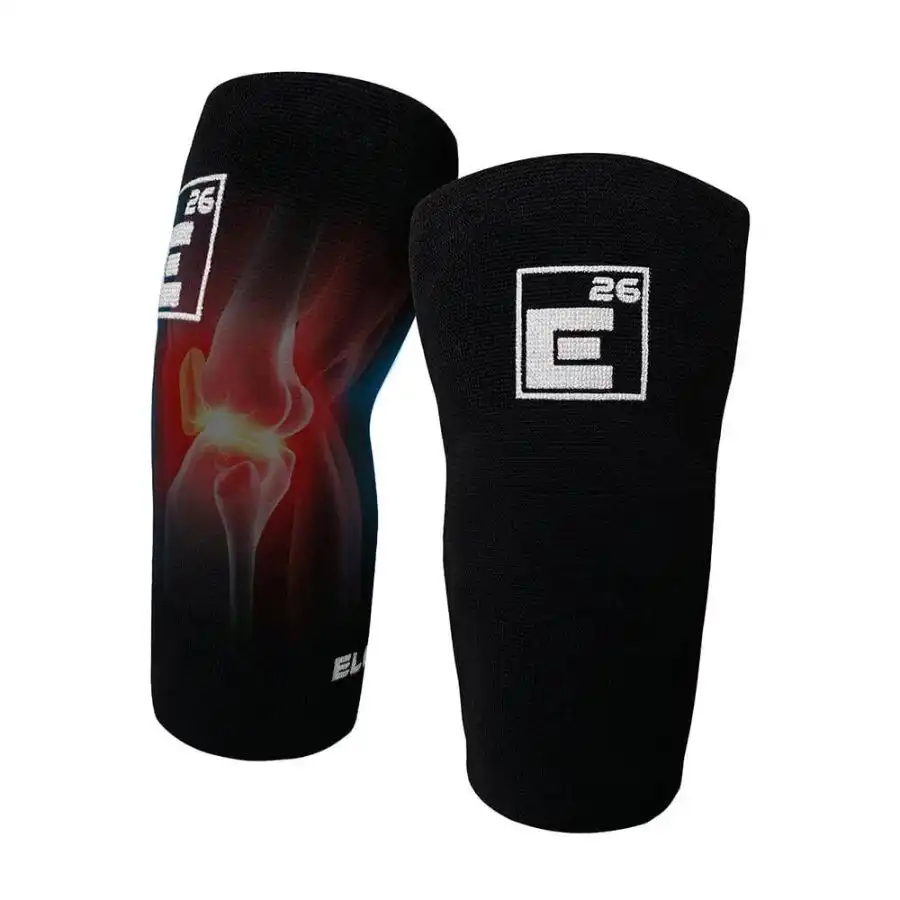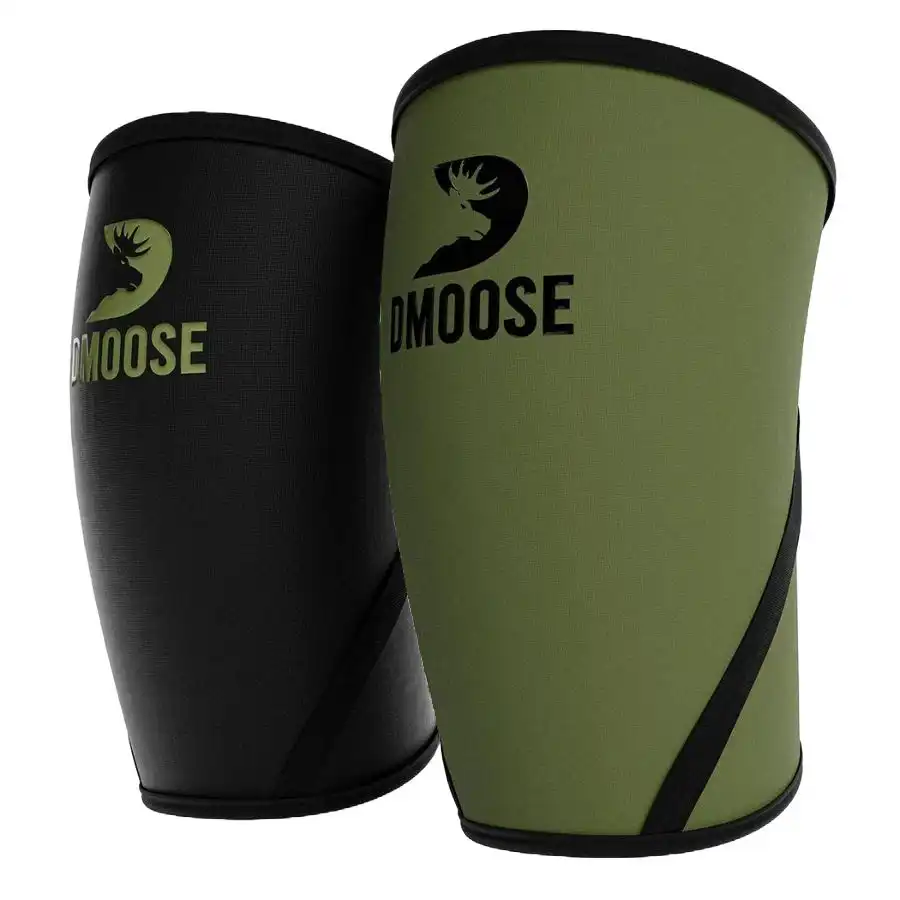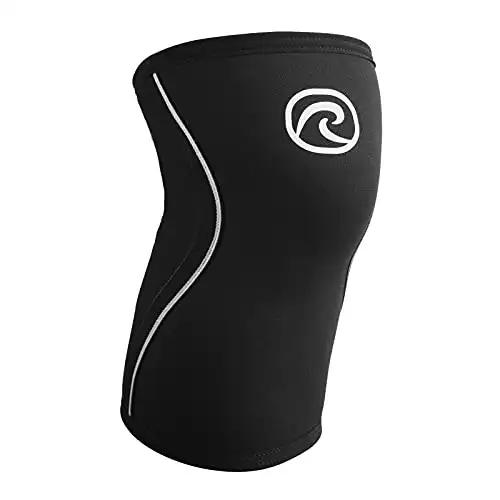We receive free products and receive commissions through our links. See disclosures page.
Whether you’re shopping for a brand new pair of the best knee sleeves or replacing your old, worn-out ones, you’re probably looking to maximize your squatting performance or minimize a chronic joint problem (hello there, creaky knees).
Breaking Muscle has a passionate team of fitness enthusiasts that includes Olympic weightlifters, powerlifters, strength coaches, and personal trainers. Altogether, we’ve tested over sixteen different knee sleeves. I personally have also been wearing knee sleeves for years during my squat sessions and, occasionally, for CrossFit Workouts of the Day (WODs).
We chose the best knee sleeves by dishing out nearly a dozen of them to our experienced product testing team of Olympic weightlifters and had them give benefits and drawbacks on each. We combined their hands-on feedback with the knee sleeve specs and their IPF & IWF approval status to give each an overall ranking from 1 to 5.
Of course, part of choosing the best knee sleeves means getting the perfect fit for you. As knee sleeves have no universal sizing, we’ve only selected brands with a helpful size chart, so you can get the right fit on your first try.
Our Top Picks for the Best Knee Sleeves
- Best Knee Sleeves Overall: DMOOSE Knee Sleeves
- Best Knee Sleeves for Squats: Gymreapers 7mm Knee Sleeves
- Best Knee Sleeves for Powerlifting: SBD Powerlifting Knee Sleeves
- Best Knee Sleeves for Arthritis: IMAK Compression Arthritis Knee Sleeves
- Best Knee Sleeves for Weightlifting: Iron Bull Strength 7mm Knee Sleeves
- Best Knee Sleeves for CrossFit: Element 26 Agility Knee Sleeves
- Best Budget Knee Sleeves: DMOOSE Reversible Knee Sleeves
- Best Knee Sleeves for Running: Rehband 3mm Knee Sleeves
Best Knee Sleeves Overall: DMOOSE Knee Sleeves
Pros
- Extra-supportive seven-millimeter thickness
- Durable double-stitching
- 30-day guarantee
- Three colors
- Five sizes
Cons
- No XS size
- No exchanges or returns after opening
- Not IPF or IWF-approved
The DMOOSE knee sleeves are the best knee sleeves overall due to their supportive seven-millimeter thick neoprene material, build quality, and 30-day money-back guarantee.
Made from neoprene, these offer an incredible amount of stretch and support for your knees. Seven millimeters is the ideal thickness for lower-body strength training. While you’ll feel the most support on knee-focused exercises like squats, lunges, and step-ups, you’ll also feel the benefits of DMOOSE’s knee sleeves in posterior-chain movements, like deadlifts and good mornings.
The double-stitching on these sleeves makes the seams much less likely to begin unraveling. It also adds an extra layer of durability, giving you greater peace of mind that they’ll last years of solid use.
DMOOSE offers a 30-day money-back guarantee, which is great for support products in general, and is one of the only companies out of all the knee sleeve options in this article that offers a money-back guarantee. While lower-quality knee sleeves may feature a lower price tag, they usually come without this assurance. If the DMOOSE knee sleeves don’t meet your standard, you can get your money back.
The sizes available for these knee sleeves are more limited than other brands, running from small to double extra-large. As a result, lifters with smaller or exceptionally large legs might have a more challenging time finding an ideal fit. If this concerns you, consider the SBD sleeves instead — they offer 11 different sizes.
DMOOSE’s return policy could be better. They offer free returns but don’t accept opened products, according to their return policy. This means that as soon as you physically open your knee sleeve’s package, you’ll lose the opportunity to exchange or return them if you got the wrong size. Because of this, ensure you correctly measure based on their sizing chart to maximize the chances of ordering the proper size. That said, you’d technically be eligible for a return under their 30-day guarantee if they don’t perform satisfactorily in that timeframe.
Unfortunately, these knee sleeves aren’t IPF or IWF-approved. For competitive powerlifters and weightlifters, you’ll have to look elsewhere for knee sleeves permitted for a meet under either of those federations.
All the above considered, we rank these 4.5 out of 5 stars for their extra-supportive seven-millimeter thickness, durable double-stitching, and 30-day guarantee.
Best Knee Sleeves for Squats: Gymreapers 7mm Knee Sleeves
Pros
- Durable neoprene and reinforced stitching
- Approved for use in IPF
- Backed by 1-year replacement warranty
- Free returns from the United States
- Includes a free carrying bag
- Three colors
Cons
- Only five sizes are available
- Return policy could be improved
I’ve owned the Gymreapers 7mm Knee Sleeves for over two years and use them at least once a week. Not only are the neoprene material and stitching quality impressive, but I love their 7mm thickness. It makes them supportive but not so restrictive that I have to take them off or roll them down between sets. Plus, they rarely slide down unless I wear a pair of slick leggings, and even then, it’s only minor adjustments between sets. Despite the consistent use I’ve put them through, the edges are all still intact, and there are no signs of framing in the seams — these get an A+ for durability in my books.
The Gymreapers 7mm knee sleeves are approved by the International Powerlifting Federation (IPF). This is great if you’re a competitive powerlifter or aspire to compete in one of the most recognized federations worldwide because you can train with the same gear you’ll be competing with. Practicing your squats with the exact same support gear you’ll be using in your meets can offer noticeable physical and psychological benefits that could give you an edge over your competitors.
A one-year replacement warranty also backs these knee sleeves. My knee sleeves from Gymreapers are still going strong after two years of consistent use, so I highly doubt you’ll ever need to use their warranty. But unlike a quality squat rack, support wear like knee sleeves will accumulate wear and tear above a cosmetic level. Even if you never need it, this policy is thoughtful and gives you peace of mind for an entire year in a product space where warranties are rare.
Gymreapers’ return policy could be better for these knee sleeves. At the time of writing, their return policy claims that they don’t accept returns that have been worn or washed or have visible signs of use. However, I seriously doubt Gymreapers would reject a return because you tried on the knee sleeves, realized they don’t fit correctly, and either want an exchange or your money back. Leg proportions and design vary widely, so it can be challenging to get the ideal size, even with their size guide. So, if you want the ability to return or exchange them, keep this in mind before purchasing.
I found the size chart accurate and the fit excellent, but it would be helpful if they offered more sizes. Gymreapers features five sizes (S to XXL), which is standard for knee sleeves. That said, those who are more petite or have lean legs may find that even the small size is still too big to fit correctly.
All the above considered, we rank these 4.5 out of 5 stars for their durable neoprene, reinforced stitching, IPF approval, and one-year replacement guarantee.
Best Knee Sleeves for Powerlifting: SBD Powerlifting Knee Sleeves
Pros
- Approved for IPF & IWF use
- Patented, world-renowned SBD construction
- 11 sizes available: 3XS to 5XL
- Manufactured in Great Britain
- Great exchange policy
Cons
- Challenging to put on
- Expensive at $125 per pair
SBD is world-renowned in powerlifting circles as the top choice for knee sleeves because they’re incredibly supportive, are manufactured in Great Britain, and you’re almost guaranteed to find an ideal fit among their 11 sizes.
If you want the crème de la crème of knee sleeves for powerlifting, look no further than the SBD powerlifting sleeves. They’re approved by the International Powerlifting Federation (IPF), which makes them suitable for IPF-affiliated powerlifting competitions. Aspiring world-record-setting powerlifters trust this brand, so it’s hard to go wrong if powerlifting is important to you.
The SBD knee sleeves are built from high-density seven-millimeter neoprene, which SBD claims offers maximum compression and contact area for your knees as they bend. Their patented design also boasts a four-way stretch that allows them to keep the high compression they’re known for without gagging around your knees during your lift. A product tester from the Breaking Muscle team put the SBDs through squats, cleans, snatches, and split squats. He noticed that despite their high compression level, they didn’t feel super restrictive. This means that they’ll continue feeling comfortable during lengthy squat workouts.
I was immediately impressed with the size range of the SBD knee sleeves. They carry a staggering 11 different sizes, from 3XS to 5XL! With this many sizes and a detailed fit guide, you’re practically guaranteed to find your ideal fit. If you don’t succeed on the first order, they offer a great exchange policy: the knee sleeves may be tried on but can’t be used for a workout, and you can request an exchange up to 30 days after receiving them. Regarding exchange policies, I think this is one of the fairest of all companies in this article.
The SBDs are manufactured in Great Britain (GB), which immediately sets them above most knee sleeve brands that import theirs from overseas manufacturers. There are higher manufacturing and worker standards in GB, so you can trust the high-grade neoprene and double stitching to hold firm as you hit new PRs.
Our product tester found the sleeves lived up to their hard-to-get-on reputation; they had to be folded in half and then dragged up his lower legs before being rolled over. Because they’re so grippy, you’ll get a mini arm workout to start your squatting session. Applying a bit of baby powder to your legs beforehand can make this experience noticeably easier.
The price of these knee sleeves is also one of the highest in this list at $125.00 per pair. Unless you’re a competitive powerlifter or want the best for your powerlifting-style squat sessions, there are more affordable options, like the Gymreapers 7mm Knee Sleeves.
All the above considered, we rank these 4.2 out of 5 stars for their IPF & IWF approval, world-renowned construction, and 11 sizes available.
Best Knee Sleeves for Arthritis: IMAK Compression Arthritis Knee Sleeves
Pros
- Soft and stretchy cotton-spandex blend
- Provides warmth and mild compression
- Affordably priced at $17.99
- Can be worn all day or all night
Cons
- Might roll down over the day
- Limited sizes
The IMAK Compression Knee Sleeves are made from soft cotton and stretchy spandex to offer comfort and mild compression all day (or night), making them the best knee sleeves for arthritis.
These compression sleeves are made from a soft and stretchy cotton-spandex blend. This material combo makes it easy for you to slide them on and off. Being 92% cotton, they’ll offer warmth while still being breathable, so they won’t cause your knees to sweat excessively.
The thickness of the knee sleeve wasn’t listed on their product page, but one customer mentioned the IMAKs are so lightweight that they forget they even have them on. It means they won’t be too compressive, so you can wear them all day or night without worrying about cutting off your circulation. For those with arthritis, this is a good thing. If they were super thick and bulky, they would be noticeable around the clock, and wearing them for long periods would be completely off the table. The cotton material can also help soothe some symptoms of arthritis by providing warmth to your knees.
They’re pretty affordable, which is likely due to most of their material being cotton, a more economical option than neoprene. However, they’re also sold in singles, which is great, as you can purchase a single sleeve if your arthritis is in one knee only. If you need a pair of them, they’re still priced economically. Retailing at just $17.99 at the time of writing, they’re the most budget-friendly knee sleeves in this article, even when a pair is bought. As far as non-invasive treatments go for arthritic knees, these knee sleeves are a great low-cost option.
Unfortunately, the IMAK knee sleeves are only available in five sizes. If you’re extra petite or have extra-lean legs, you might find that the XS size isn’t small enough. Similarly, their sizes cap out at an XL — which may pose an issue if you or your knees are significantly larger than average.
The IMAKs may have trouble staying in place throughout the entire day. They have a stretchy tri-band, but due to their lighter compression material, they won’t be as resistant to movement at the knee. One reviewer mentioned that their knee sleeves kept rolling down on them, but other reviews didn’t mention this, so that may have been an issue of improper sizing.
All the above considered, we rank these 4 out of 5 stars for their cotton-spandex blend, warmth and compression, and affordable price.
RELATED: Got Knee Pain? Fix Your Tracking in the Squat and Lunge
Best Knee Sleeves for Weightlifting: Iron Bull Strength 7mm Knee Sleeves
Pros
- IWF- and IPF-approved
- High-grade neoprene and double-stitched seams
- 30-day money-back guarantee
- Seven colors available
Cons
- Return policy could be better
- Shipping policy could be improved
Iron Bull Strength’s knee sleeves are approved by the International Weightlifting Federation (IWF). For actively competing veterans and beginner weightlifters just starting out, being able to train with the exact same equipment that you’ll be competing with is a distinct advantage. After training regularly with them, you’ll feel comfortable with the compression and support as you squat out of the hole on a heavy clean or snatch. Having practice with this before your competition makes the difference between them being a performance enhancer instead of a distraction.
What I’m most impressed about regarding the Iron Bull Strength knee sleeves is their dual approval. These sleeves are also approved for use in the IPF. Typically, knee sleeves are designed explicitly for powerlifting or weightlifting use — being certified for both sports at the highest level is a rarity. If you like to dabble in these strength sports or want to without sinking more money in support gear, these are the sleeves for you.
These knee sleeves are made from high-grade neoprene. They feature extra durable double-stitched welded seams that, according to Iron Bull Strength, are incredibly strong and significantly reduce the risk of failure. This is exactly what any serious weightlifter wants — gear they can trust when training and on the platform.
Iron Bull comes with a 30-day return policy, starting when you receive your knee sleeves. However, they must be in the same condition you received them in: unworn/unused, with the tags intact, and in the original packaging. In other words, they have to be brand new. That means you can’t even try them on without losing your ability to return or exchange them, which we don’t love.
Plus, if you do end up needing to return them, it’ll be at personal cost. Original shipping costs are non-refundable unless damaged, defective, or there’s a shipping error. Make sure to use their detailed sizing chart to minimize the risk of ordering the wrong size.
All the above considered, we rank these 4.5 out of 5 stars for their IWF and IPF approval, high-grade neoprene with double-stitched seams, and 30-day money-back guarantee.
RELATED: How to Train the Squat for Both Powerlifting and Weightlifting
Best Knee Sleeves for CrossFit: Element 26 Agility Knee Sleeves
Pros
- Unrestricting three-millimeter thickness
- Breathable & sweat-wicking material
- Comfortable tapered shape
- Lifetime warranty on manufacturing defects
Cons
- Only three sizes are available
- Not IPF/IWF approved
- Only one color option
CrossFit is widely known for its exercise variety, from one-rep max squats to hour-long conditioning sessions. Because of this exercise range, finding knee sleeves for CrossFit can be a serious challenge. Three-millimeter sleeves are ideal when joint mobility and comfort are prioritized, like for longer cardio-focused WODs. Meanwhile, seven-millimeter knee sleeves offer the best support and compression for heavy strength training.
As a result, CrossFitters often resort to buying TWO separate pairs of knee sleeves and using the one that best aligns with the WOD they’ll be doing. This is a mistake that ends up costing them twice as much.
Enter the Element 26 Agility Knee Sleeves.
The Element 26s are a lightweight sleeve, making them ideal for CrossFit. They’re only 3mm thick, offering excellent mobility for those longer endurance-focused WODs. Since they’re considerably thinner than 7mm knee sleeves, they’ll also be more comfortable and less restrictive for the conditioning components of your WODs like running, skipping, or rowing.
Contrary to what some CrossFitters think, they don’t need super thick knee sleeves because Crossfit isn’t just about lifting heavy — it’s about being an amazing all-round athlete. For this reason, a pair of 7mm sleeves often ends up being too thick and complete overkill. Ultimately, this means you can invest in and wear one pair of knee sleeves…no more flipping between two pairs or spending money you don’t have to!
The Element 26s are highly crafted to ensure they’re as breathable as can be. They’re built with a hybrid nylon-elastic blend, which is designed to absorb sweat and evaporate it to keep you more comfortable. For serious CrossFitters, every legitimate advantage can give you an edge in crushing your WODs with the best time possible — including effective sweat management, especially in hot gyms.
According to Element 26, these knee sleeves are anatomically designed. This likely means they’re made in a tapered shape to follow the natural contours of the average lifter’s leg, knee, and calf sizes. As such, they should stay in place without bunching behind your knees, which can be uncomfortable and cause your skin to rub.
For knee sleeves, this feature is seriously underrated — especially for CrossFit. The last thing you want in your WODs is to pull your knee sleeves up after every burpee because they’re sliding down or readjust them after every set of wall balls because they’re bunching up behind your knees and causing your skin to chafe.
Only three sizes are available (S to L). CrossFit and other similar training styles are rising in popularity, so I’m disappointed that there isn’t a more extensive range of sizes.
The IPF or IWF doesn’t approve these for competition use. However, I don’t think that matters if you’re using them for CrossFit because they’re not designed to squeeze out every drop of your powerlifting or weightlifting performance — they’re made to help you perform better as a hybrid athlete.
All the above considered, we rank these 4.5 out of 5 stars for their unrestricting 3mm thickness, breathable & sweat-wicking material, and comfortable tapered shape.
RELATED: Best CrossFit Shoes for Flat Feet, Wide Feet, and More (2023)
Best Budget Knee Sleeves: DMOOSE Reversible Knee Sleeves
Pros
- Budget-friendly price
- Solid overall construction
- USPA-approved
- Reversible 2-sided colors
- Includes storage bag
Cons
- Not IPF/IWF-approved
- Main material not listed
At the time of writing, the DMOOSE Reversibles retail at $39.00 but were on sale at $35.00. For knee sleeves, this is an excellent price at the 7mm thickness. Great quality 7mm knee sleeves generally range between $50.00 and $70.00, with the higher-end coming from popular name brands. Being only 35% of the cost of the top-tier SBD Powerlifting knee sleeves, these are definitely within reach for the budget-conscious lifter.
I’m impressed with the quality of these sleeves despite their economical price. With lower prices, you’ll usually see obvious corners cut: no double-stitched seams, 3-5mm thickness, and poor fits. However, these Reversibles break the mold in each category.
They share the same durable double-stitched seams of more expensive sleeves, which means you get the same reassurance from knee sleeve blowouts. They feature the same 7mm thickness as pricier brands, so you get the same extra-supportive fee on your squats. They’re even anatomically shaped to ensure they’ll fit correctly for most people.
I’m pleasantly surprised that these are approved by the United States Powerlifting Association (USPA). To offer the lowest price, companies usually cut costs wherever they can, and competition approval is often the first to be discarded because the approval process is expensive. It’s only a single powerlifting federation, but the fact that these are approved for in-competition use in the USPA — which claims they’re the largest powerlifting federation — is a big plus.
Despite being USPA-approved, they aren’t permitted for competition use in the IPF or IWF, and it’s unlikely they ever will be. As the most prestigious federations for powerlifting and weightlifting in the world, respectively, approval costs for equipment are significantly higher. Seeing these are budget-friendly knee sleeves, I think the lack of certification is entirely understandable.
The product page doesn’t specify what material these reversible knee sleeves are made of. Quality knee sleeves are almost always made with neoprene because of its stretchy support and compression. However, cheap knee sleeves can be made with similar-feeling materials that are lower in quality and durability than neoprene. Unlike the DMOOSE knee sleeves that won our Best Knee Sleeves Overall, assuming neoprene is the primary material might not be wise considering they’re such a budget-friendly price.
All the above considered, we rank these 4 out of 5 stars for their budget-friendly price, solid overall construction, and USPA approval.
Best Knee Sleeves for Running: Rehband 3mm Knee Sleeves
Pros
- 3mm thickness is ideal for running
- Reputably handmade in Europe
- Seven sizes are available for an ideal fit
- Fits left or right knee
- Multiple colors
Cons
- Not supportive enough for CrossFit
- Partially made from lower-grade neoprene
When it comes to knee support while running, these Rehbands take the cake. They’re built with neoprene but in a lightweight 3mm thickness, which is just right as far as thickness goes.
While great for weight lifting, 7mm is too much support and compression for running — even a thinner 5mm is still too thick. 3mm allows you to use your regular stride without modifying it unnaturally for your knee sleeve. The 3mm thickness keeps your knees warm while allowing for ample flexibility as you hit the road for miles, making it the best option for running.
Rehband has been around since 1955, and these knee sleeves are a testament to their reputation as a company. They’re handmade in Estonia, so they must adhere to higher manufacturing and working standards than other countries overseas, who might cut corners in their construction processes, or mistreat workers — resulting in lower-quality products. This means you can rely on knee sleeves from Rehband being higher quality than cheaper alternatives.
These knee sleeves for running come in seven sizes, from XXS to XXL. I’m happy to see this range of sizes because whether you have lean or heavily muscled legs, you can be reasonably sure you’ll find a size that will fit. More importantly, using their size chart to find an ideal size for your leg proportions will ensure your knee sleeves stay in place for your runs.
These Rehbands aren’t ideal for CrossFit. The 3mm thickness is too thin to provide noticeable support for the heavier loads and impacts seen in strength-focused WODs from thrusters, box jumps, and barbell back squats. If you choose to use them for CrossFit anyway, they’ll still offer warmth and proprioception for your knees.
The Rehband 3mm’s are made from 70% SBR (styrene butadiene rubber). Compared to neoprene, SBR is lower quality because it has less compressive resistance. This would be a bigger concern if you needed to use them for weight lifting, so they’ll be just fine for running
All the above considered, we rank these 4 out of 5 stars for their ideal thickness for running, reputable manufacturing, and seven sizes available.
RELATED: Size Doesn’t Matter – But Your Technique Does (For Running, That Is)
Benefits of Knee Sleeves
Compression and Support
Knee sleeves offer a dual advantage of compression and support for your knees during lower body workouts, especially for exercises that involve bending and extending your knees.
The compression they provide not only enhances blood circulation but also stabilizes the surrounding ligaments, tendons, and your kneecap. This added stability is a game-changer whether you’re an athlete or fitness enthusiast, allowing you to perform at your best while minimizing the risk of injury.
Increased Blood Flow
One of the often-overlooked benefits of knee sleeves is their ability to promote increased blood flow to the knee area. The compression from knee sleeves generates a gentle warmth, which feels comfortable and encourages better circulation.
Assistance “Out of the Hole” When Squatting
For avid weightlifters, knee sleeves can be a lifeline for squats. They offer crucial assistance during the initial phase of a squat’s ascent, commonly called “coming out of the hole.” By providing additional support and stability, knee sleeves help lifters push through this challenging point in their squat, which can be a secret weapon in achieving new personal bests.
Increased Proprioception
Wearing knee sleeves can boost your proprioception, the body’s awareness of its position in space. With knee sleeves, you’ll have a heightened sense of where your knees are during squats, lunges, and step-ups. This increased awareness can make a significant difference, helping you maintain proper form and alignment. You’ll be more attuned to the way your knees bend and extend, potentially reducing the risk of improper movement that might lead to injury.
What to Consider When Buying Knee Sleeves
Materials and Construction
Knee sleeves are made from various materials, depending on their purpose.
Sleeves for arthritis are often made with a cotton/spandex blend to ensure they’re breathable and comfortable to wear all day.
3mm to 7mm knee sleeves will almost exclusively be made with “neoprene,” a unique type of rubber-like foam material that’s also used as the primary material for wetsuits. Because of its stretchy form-fitting properties, it’s considered the gold standard for knee sleeves.
Reinforced stitching is needed if you want a pair of knee sleeves that won’t unravel after a few months. This is commonly practiced by double-stitching, though cross-pattern double-stitching, like what’s used on the Element 26’s, is even better to reduce the chances of any threads coming loose.
Neoprene Quality
Neoprene comes in different qualities or grades, sometimes listed on knee sleeve product pages as SBR, SCR, and CR.
- SBR (styrene-butadiene-rubber) is the lowest quality of neoprene because it has lower compression resistance and is cheaper overall. Companies who don’t want to disclose that they use this lower-quality SBR material may try to list it as “neoprene” without mentioning the quality or grade.
- CR (chloroprene rubber) is the highest quality of neoprene. Despite its higher price, it has great elasticity and strength, making it an excellent choice for knee sleeves. Companies might mention using high-quality/high-grade neoprene when they use CR to demonstrate that their knee sleeves are genuinely made from premium neoprene.
- SCR (styrene chloroprene rubber) is a medium-grade neoprene that combines the properties and qualities of SBR and CR. This is a suitable happy medium for knee sleeve material as far as quality and value go.
Thickness
Knee sleeves come in various thicknesses depending on the activity you need them for.
- 3mm is relatively thin and will only give light support and compression to your knees. Because of this, 3mm is best for cardio activities like running and endurance-focused CrossFit workouts, where you want warmth and lightweight support that won’t impair your joint flexibility.
- 5mm to 6mm will offer a medium level of support and compression. Because of its thicker layer, it’s ideal for hybrid activities like resistance-focused CrossFit metcons and circuit training.
- 7mm gives noticeably more support and compression for weight lifting. As a result, they’ll generally feel tighter, which makes them great for heavy squats, but they aren’t the most comfortable for longer workouts over two hours.
Sizing
For starters, always use the brand’s fit guide to ensure you select the correct size of knee sleeves, providing a fit that’s not too tight or loose.
If you want more pop out of the hole, opt for a tighter pair of knee sleeves by sizing down. If you want them to be less compressive or restrictive, size up instead.
Sleeve Shape and Fit
There are no universal knee sleeve sizes or shapes, so the same knee sleeve size can feel and fit completely differently between two brands.
Generally, there are three knee sleeve shapes: straight, hourglass, and tapered. All of these shapes refer to the difference in widths between the top, middle, and bottom of the sleeve.
- Straight is precisely as it sounds and is best for people with the same size of thighs, knees, and calves.
- Hourglass-shaped sleeves are smaller at the kneecap but are designed for larger thighs and calves.
- Tapered is the most common, which follows the standard anatomical shape of most people’s legs. The thighs are largest above the knee, followed by the knees, with the calves being the smallest.
Competition Approval
As a competitive powerlifter or weightlifter, practicing like you play will give you an advantage come meet day. Competition-approved allow you to use them in your training and get every pound out of them in your meet.
Federation rules vary widely, so check to see what knee sleeves are permitted for your federation. However, powerlifters and weightlifters should consider the International Powerlifting Federation (IPF) and International Weightlifting Federation (IWF) approved equipment lists as the gold standards, respectively.
Competition-approved knee sleeves also tend to be more durable than their non-approved counterparts because the former must meet a specific standard for use in IPF and IWF meets.
Warranty
Warranties on support wear are underrated. I’d encourage you not to overlook one, just in case the knee sleeves don’t meet your performance standards or their threads unravel in a few short months.
I’d recommend settling for no less than a six-month warranty. Support wear will inevitably wear and tear, so it’s unrealistic to expect them to endure forever. That said, a 1-year warranty is considered excellent for knee sleeves and will give you more peace of mind during your workouts.
Return Policy
To ensure you’re not stuck with a pair of ill-fitting knee sleeves, I recommend buying from a company that offers a fair return policy. That way, you can exchange them or get your money back if they don’t fit correctly.
At the bare minimum, they should allow you to return or exchange your knee sleeves within 14 days of receiving them, and you should be allowed to try them on to confirm the size you choose will work. Generous policies extend the return period to between 30 to 60 days.
Your Strength Level
Like any support wear, knee sleeves will experience wear and tear over time. However, this process will accelerate the stronger you are.
As advanced or elite-level strength athletes lift significantly heavier weights than rank novices, their knee sleeves will take on more strain, wearing out faster.
Colors
Not everyone loves the jet-black look. If you like color-coordinating your workout outfits, consider shopping with a brand that offers multiple colors.
It’s a creative way to add some of your personality to your lifting gear. Plus, it’ll be hard to misplace your knee sleeves if they’re hot pink.
Final Thought
Knee sleeves are an excellent tool for supporting your knees and improving your squatting performance. When it comes down to it, though, picking the best knee sleeves for you depends on what you value regarding material, thickness, competition approval status, and more.
Best Knee Sleeves: Side-by-Side Comparison
Best Knee Sleeves Overall
Best Knee Sleeves for Squats
Best Knee Sleeves for Powerlifting
Best Knee Sleeves for Arthritis
Best Knee Sleeves for Weightlifting
Best Knee Sleeves for CrossFit
Best Budget Knee Sleeves
FAQs
What is the best-rated knee sleeve?
The best-rated knee sleeves are the DMOOSE Knee Sleeves due to their supportive 7mm thick neoprene material, high build quality, and 30-day money-back guarantee.
What are the best weightlifting knee sleeves?
The best weightlifting knee sleeves are the Iron Bull Strength Knee Sleeves due to their supportive 7mm thick neoprene, double-stitched seams, and International Weightlifting Federation (IWF) approval.
Are knee sleeves worth it?
Yes, knee sleeves are worth it for the extra support, warmth, and awareness they give your knees while squatting.
